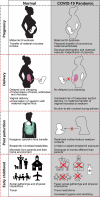COVID-19 and the neonatal microbiome: will the pandemic cost infants their microbes?
- PMID: 33960272
- PMCID: PMC8115548
- DOI: 10.1080/19490976.2021.1912562
COVID-19 and the neonatal microbiome: will the pandemic cost infants their microbes?
Abstract
Mortality and morbidity from SARS-CoV2 (COVID-19) infections in children remains low, including an exceedingly low rate of horizontal and vertical transmission. However, unforeseen complications to childhood health have emerged secondary to the pandemic. Few studies to date have examined unintended complications of the pandemic in newborns and infants. In this Commentary, we discuss the impact that COVID-19 may have on inheritance of the newborn microbiome and its assembly throughout the first years of life. In the early stages of the pandemic when vertical transmission of COVID-19 was poorly understood, several studies reported increased rates of C-sections in COVID-19 positive women. Initial recommendations discouraged COVID-19 positive mothers from breastfeeding and participating in skin-to-skin care, advising them to isolate during their window of infectivity. These shifts in perinatal care can adversely impact microbial colonization during the first 1000 days of life. While obstetrical and neonatal management have evolved to reflect our current knowledge of perinatal transmission, we are observing other changes in early life exposures of infants, including increased attention to hygiene, fewer social interactions, and decreased global travel, all of which are major drivers of early-life gut colonization. Composition of the gut microbiota in adults directly impacts severity of infection, suggesting a role of microbial communities in modulating immune responses to COVID-19. Conversely, the role of the intestinal microbiome in susceptibility and severity of COVID-19 in newborns and children remains unknown. The onset of adulthood diseases is related to the establishment of a healthy gut microbiome during childhood. As we continue to define COVID-19 biology, further research is necessary to understand how acquisition of the neonatal microbiome is affected by the pandemic. Furthermore, infection control measures must be balanced with strategies that promote microbial diversity to impart optimal health outcomes and potentially modulate susceptibility of children to COVID-19.
Keywords: COVID-19; gut microbiome; mother-infant dyad; newborn health; perinatal practice policies.
Conflict of interest statement
None of the authors have actual or potential conflict of interest in relationship to this publication.
Figures
References
-
- https://coronavirus.jhu.edu/. Accessed March19, 2021
Publication types
MeSH terms
Grants and funding
LinkOut - more resources
Full Text Sources
Other Literature Sources
Medical
Research Materials
Miscellaneous

